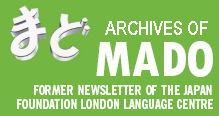28/08/2024
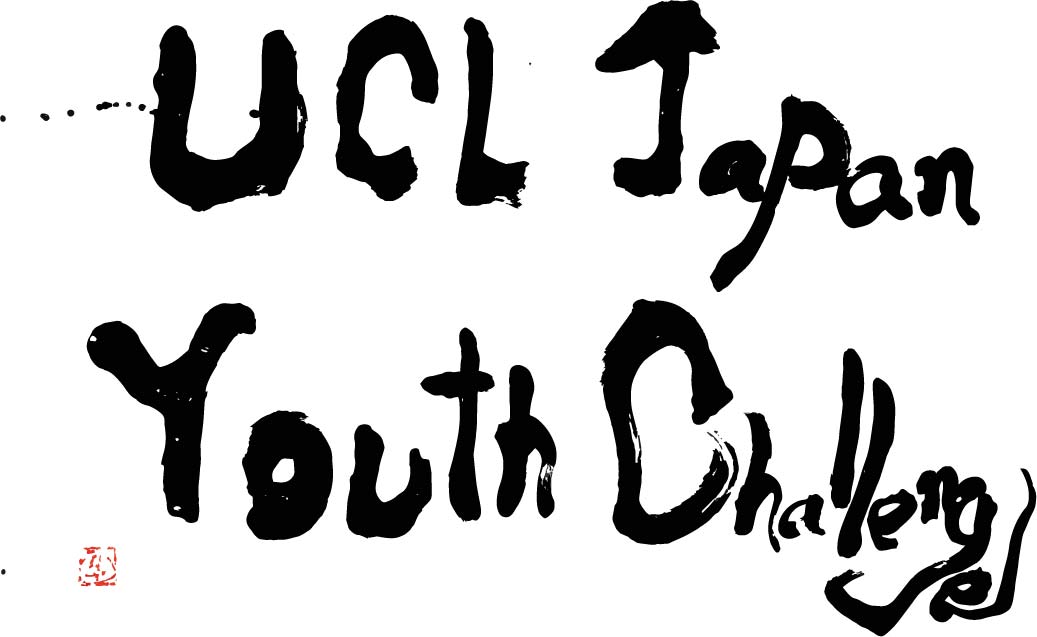
For the full programme outline of the UCL-Japan Youth Challenge 2024, click here.
This year, the UCL-Japan Youth Challenge celebrated its 10th anniversary with another successful week that celebrated cultural exchange between Japan and the UK.
Just under 30 students from the UK and 50 students of pre-university age from Japan attended this year’s prestigious summer school, spending a week undertaking a wide range of activities from lectures and workshops under leaders in academic and professional fields, to sightseeing and social activities.
The programme began on Saturday 27th July at Rikkyo School in Surrey, England, for the welcome day. Each school from Japan made a presentation to introduce themselves and their school lives, as well as their hugely diverse range of hobbies and interests. It was fascinating to learn about Japanese school culture, and the talented individuals who would be joining this year’s programme. The UK students also had their chance to introduce themselves!
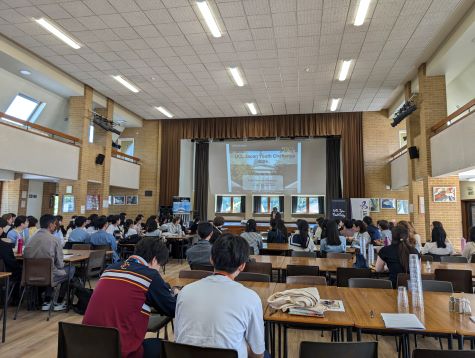
After the presentations, the students enjoyed lunch together, before an afternoon of ice breaking team activities. The day ended with a barbecue in the bright sunshine.
On Sunday, the students had the chance to visit and take a tour of UCL’s Mullard Space Science Laboratory in Surrey Hills, a world-leading research centre developing cutting-edge space research and space technology, before heading to Cambridge for their first night of stay. The participants experienced a Cambridge University formal dinner in the beautiful dining hall at Peterhouse.
On Monday, there was a morning of lectures at Hughes Hall. Prof Tamsin Ford, Professor of Child and Adolescent Psychiatry described her research in Mindfulness-Based Cognitive Therapy (MBCT) and its impact on adolescent non-responders to first-line treatments for depression. Her talk roused a lot of interest among the students, who asked many interesting and well-considered questions afterwards. This was followed by a lecture by Dr Ricardo Sabates Aysa who spoke about the challenges of implementing compulsory education systems, and a talk on soft materials in robotics by Mr Michael Ishida. Sir Laurie Bristow, President of Hughes Hall, also spoke about his experiences during the UK's withdrawal from Afghanistan.
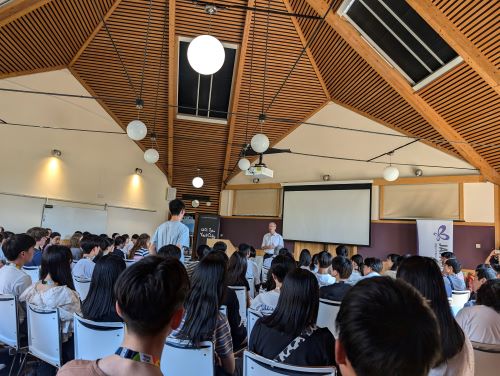 After the lectures, the students had the opportunity to go sight-seeing in Cambridge, where they also enjoyed punting on the river on a warm summer's day.
After the lectures, the students had the opportunity to go sight-seeing in Cambridge, where they also enjoyed punting on the river on a warm summer's day.
On Tuesday, it was time to go to London! The students headed straight for UCL, where they began their Grand Challenge workshop. The year's topic ‘Space and Us’ was introduced. They were encouraged to think about different issues regarding space travel, first on a broader level, then with more detail, before choosing the topics they wanted to work on for their presentations.
Ideas included the sustainability of space exploration, using space exploration for the benefit of the earth, legal frameworks around the ownership of space, and how to protect the mental health of space explorers.
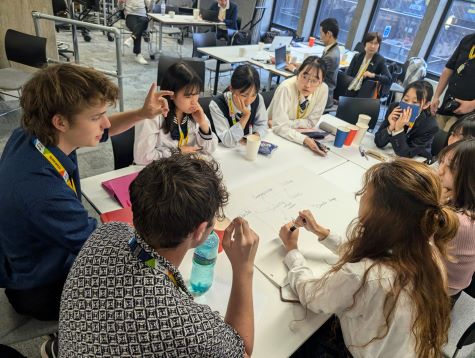 The students defined their missions, considering which factors would help and hinder their projects. They shared their ideas in English, using their knowledge gained from their experiences in different cultures. This provided the groundwork for their presentations at the symposium which they continued to work on during the week.
The students defined their missions, considering which factors would help and hinder their projects. They shared their ideas in English, using their knowledge gained from their experiences in different cultures. This provided the groundwork for their presentations at the symposium which they continued to work on during the week.
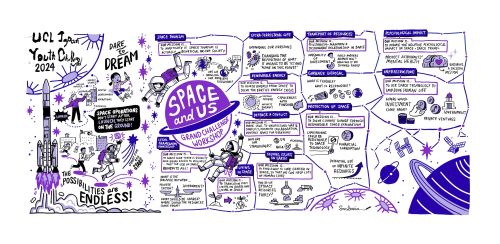 Illustration by Scriberia
Illustration by Scriberia
On Wednesday the students took language lessons. The Japanese students attended an Advanced English language class, while the students from the UK attended Japanese lessons!
They then attended lectures on Nanoelectronics, behavioural genetics, and the politics of Eurasia, before working on their group presentations.
Thursday's programme included a tour of UCL and its facilities, to give the attendees more insight into life at a top university in the UK.
After lunch, Prof Nick Tyler, an expert in Civil Engineering, detailed how civil engineering can be used to make the world more inclusive and to improve accessibility. This was followed by Prof Davide Ravasi from the UCL School of Management, who shared his expertise in design and innovation, challenging the students to think about what makes a good or bad designed item.
The Japan Foundation, London then delivered a presentation on the Japan Foundation's work in promoting mutual understanding and exchange between Japan and the rest of the world, and to give the attendees an insight into what it is like to work at an intercultural organisation.
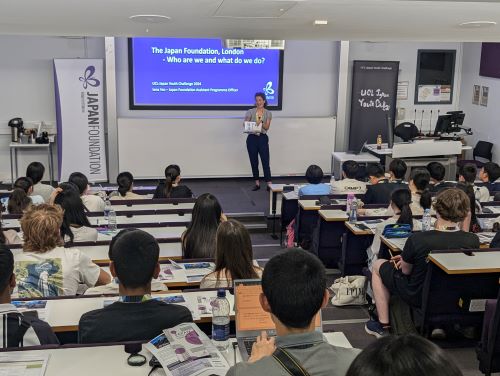
On Friday 2 August, The UCL-Japan Youth Challenge Symposium was held. It was opened with a Biwa performance by Mr Satoshi Takemoto, who explained the history of the Biwa and the significance of the pieces he played, while demonstrating a few songs on the traditional Japanese instrument.
After this, we had talks on the sun and its properties by Prof Lucie Green, and Mr Yutaro Tanaka from Mitsubishi Electric Europe explained how the company contributes technology for space travel and research.
The student presentations were next, and it was an opportunity for the students to show off their hard work during the week. Each group delivered a short presentation, followed by a Q&A session with the audience of academics and members of the public. The students covered things such as how to use space to fight climate change on earth, the challenges and benefits of space tourism, how to create a global body to prevent a potential ‘space war’, etc.
It was incredibly inspiring to see the teamwork and effort that had gone into the presentations. They answered the difficult questions from the audience with great consideration.
There were two final lectures that ended the week on a high. Dr Kate Kitagawa, Senior Counselor for International Relations at the Japan Aerospace Exploration Agency (JAXA) spoke about working for a space-related organisation coming from a non-science background. She emphasised how an individual’s special talent or skills can be used in different ways.
Next, Prof Anu Ojha OBE, Director of Championing Space from the UK Space Agency spoke about how fascinating space exploration is, the expansiveness of the universe, and discussed how important space exploration is for understanding life on earth.
After a week packed with activities, there was time to decompress with the reception, with delicious Japanese food and drinks. To commemorate the 10th anniversary of the programme, many related individuals and supporters of the Youth Challenge, including the Mayor of Camden, also attended.
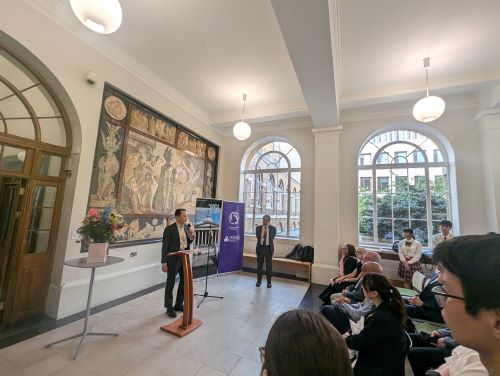
The Director of the Japan Foundation, London also extended our congratulations.
Saturday was the final full day of the programme, which was a London sightseeing day in groups, followed by a farewell party with pizza!
It was another successful and interesting year with the UCL-Japan Youth Challenge.
We would like to offer a huge congratulations and thanks to the organising committee of the UCL-Japan Youth Challenge.
To find out more about this year’s programme and keep up to date with information about future programmes, please visit the UCL-Japan Youth Challenge official website here.



 Japanese Studies & International Dialogue Navigation
Japanese Studies & International Dialogue Navigation
